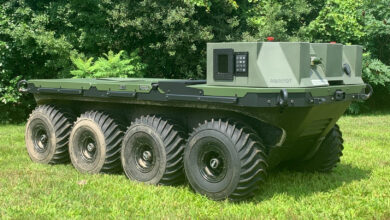US Army Special Operations Command (USASOC) has acquired an undisclosed number of hand-launched unmanned aerial systems (UAS) capable of blocking enemy electronic signals in “contested areas.”
Information concerning the acquisition was included in the Department of Defense (DoD) 2021 budget estimate.
The DoD doesn’t provide extensive detail concerning features of the “classified” drone — developed under Project Hornet — apart from stating that the mini aircraft is designed to be “versatile,” with the capability to jam a range of electronic devices.
In Possession With Special Forces Command
The information which was provided states that the system has successfully “demonstrated” its capabilities, adding that the project has been “transitioned” to the special forces command, awaiting distribution to special forces units of the US Army.
American forces currently employ a variety of UAS for kinetic and surveillance purposes.
This is, perhaps, the first instance of a project being mentioned officially where a UAS is specifically designed to counter adversary electronic communications.
British Army troops stationed in Mali have recently been provided with mini-drones fired from grenade-launchers which offer similar capabilities.
The drones are designed to carry a range of payloads that can be used for kinetic and non-kinetic functions, including jamming enemy electronic communications and sensors.
Jamming Insurgent Phones
Listing out the possible devices the Hornet could jam, Forbes wrote that the UAS can block “signals for cell phones, walkie-talkies or other radio devices.”
The outlet suggested places where the system may optimally be used, saying that in Iraq insurgents have long used cell phones to coordinate their operations.
In places such as Afghanistan and India, government agencies have successfully utilized control over mobile communications to deprive insurgents of cell phone usage.
In Iraq, however, insurgents intimidate network providers to maintain mobile phone communication.
Blocking GPS Devices
Forbes further said that a jammer the size of a cell phone fitted in an unmanned aircraft can block or “spoof” the Global Positioning System (GPS) of an entire city, adding that the system could also be used to incapacitate enemy radar.
Proving additional examples of the system’s effectiveness, security and counter-terrorism analyst Robert Bunker told Forbes: “One of these electronic warfare drones could position itself over a terrorist or insurgent safehouse to electronically isolate it before it is raided.”
“The drones could be used to electronically isolate and suppress specific targets within a tactical bubble.”
Bunker also envisaged Hornet could be used to deactivate “grenade-dropping” drones used by militants.
“A convoy could launch one of these systems in a counter-UAS mode to neutralize a hostile weaponized drone,” Bunker said.












